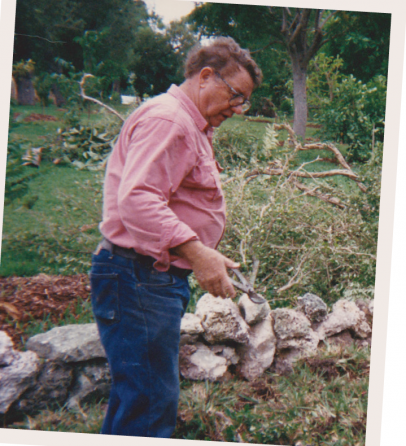Dealing with Garden Pests: To Spray or Not to Spray?
Sustainability is the keystone of the home garden. Yet we are bombarded by modern chemical ways offering convenience and effectiveness. Who can the home gardener turn to for direction, assurance and strength of conviction?
For me it was my father. Growing up in Homestead, I always kept a close eye on what he planted, when he pruned and how he dealt with unwanted pests. I looked for discrepancies in his story, but he practiced what he preached. Yet once, when faced with both an impending sabbatical and explosion of weeds, my father applied an herbicide in our garden. It was just once, but he lamented this fateful decision for the rest of his days. Not only did the home garden suffer an imbalance in our ecosystem that lasted for decades, but he felt guilty for taking the easy way out of a situation.
The home garden is a personal choice – a statement – and what you do there says a great deal about you. Some of us are fruit growers; some lean toward vegetable growing; others prefer native landscapes; some are all of the above. We must decide how we want to conduct ourselves in terms of agrochemicals and ecology and what we want to teach our children.
I remember my father's anguish over the herbicide. It killed the weeds, but it affected the soil flora and fauna, too. You end up with regrowth of resistant and even tolerant weeds and plants. You also allow for the entry of other plants that now have a competitive advantage. Insecticides kill both target and non-target insects, further shifting the balance.
I was changed by my father's act of compromise. Out of desperation he applied a chemical to save time and labor, but his regret at this action instilled a strong belief in me, a mantra for my life: No shortcuts in the home garden. No chemical use.
A Place For Chemicals
Please note – I am not condemning the use of agro-chemicals and modern commercial agriculture. Rather, I am drawing a distinction between the home garden and the economic activity that is food production. The home garden supplements my family's life and adds quality to our lives. I make the time to pull the weeds, outsmart the pests and tend to the honeybees and the chickens. If I don't have the time, well, then I must simply accept the "nature" of my home garden.
A chemical option for weed, fungus or insect control is no option at all. Without chemicals, one must rely on education, genetics and the nature of things to cope with everything that will be thrown at the home gardener. There will always be a new scale or a new disease. The global climate will always be changing. So one had best be ready with a nonchemical response.
Grow the Right Stuff
Let us address the curious case of growing something that's not adapted to our climate or location. I understand entering into this activity with eyes wide open for the sake of learning, teaching or necessity. My sons often grow plants simply because they're interested in them. I know they're not suited to our climate, but I bite my tongue. This educational exercise, however, does not serve as a valid excuse for chemical use. In the home garden, there are wonderful fruits and vegetables that are disease tolerant and adaptable to heat. If you grow the right avocado or mango or the proper tomato, you can avoid the need for any spraying. Do your research and drive around your neighborhood. Talk with the old-timers in the community. They've learned by trial and error what will work, and they have great ideas. Pay attention when they talk about an Everglades tomato or a Seminole pumpkin. Heirlooms and modern marvels alike are due their day in the garden – the ultimate proving ground.
Timely Planting
Timing is another key to spray avoidance. If you plant your vegetable garden in October, you're assured of pests and disease because it's hot and humid. Every year I'm tempted to plant my vegetables before Halloween, but invariably there will be a couple days of hard rains. During these days, my young plants are devastated by disease. Here's where the weaker gardener reaches for the fungus spray, but I admit defeat (again) and replant once conditions are more conducive. Admitting our gardening failures is not weakness, but it does beat you down. This is exactly when manufacturers take advantage of the home gardener, whispering in your ear about the miracles of modern chemical ways.
Avoid Temptation
Then there are those years during which nothing can be done. The rains come and the heat rises and you must start over. A new plague besets the home garden, hungrier and more resilient than ever, to test your resolve. That's when you think: Only a single spray. It won't hurt anything. No one will ever know. But you're wrong. The garden predators know and so do the beneficial fungi. The deal has been struck and the debt now owed. You spot a dead honeybee, nature on the job, and feel guilty. Was her death by my hand? You've upset the balance of nature and it will take years to recover. Can you ever forgive yourself?
In commercial agriculture, by law we must post signs about re-entry after spraying to protect the innocent and dissuade people from entering and endangering themselves. In the home garden, we would never post a sign – imagine the stigma attached to those who advertise their actions. The neighbors would gossip, your children would be devastated.
Choose wisely, fellow gardener. Plant timely, be patient and most of all, forgive yourself for feelings of weakness. It's natural to want to take the easier road. But beware the thorn beneath the rose.




